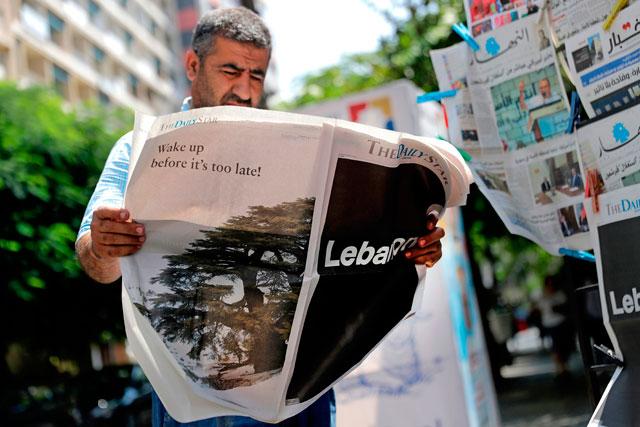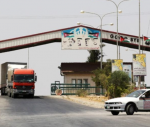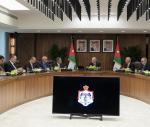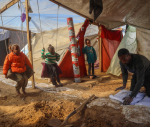You are here
Lebanon crisis deals blow to once-thriving press
By AFP - Feb 04,2020 - Last updated at Feb 04,2020
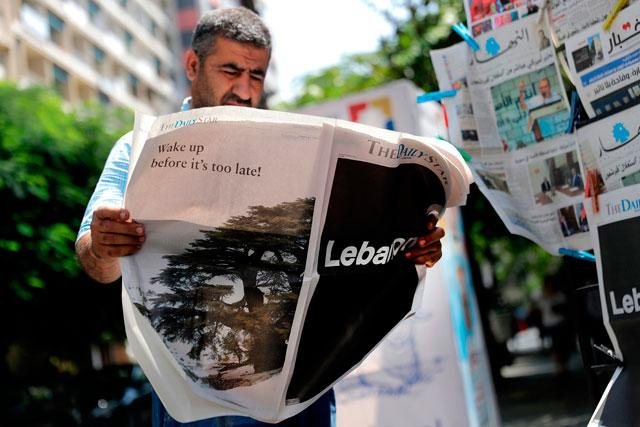
This file photo taken on August 08, 2019, shows a man checking a copy of the Lebanese local English-language newspaper ‘The Daily Star’ in the capital Beirut (AFP photo)
BEIRUT — Publications disappearing from newsstands, radio and TV channels struggling to stay on air: Lebanon's once-flourishing media is collapsing under the weight of the worst economic crisis in decades.
The Daily Star, Lebanon's only English-language newspaper, which suspended its print edition on Tuesday, is the latest casualty.
It comes shortly after the English-language Radio One broadcaster went off air at the weekend after nearly four decades.
Due to funding shortages in recent years, a series of prominent dailies and broadcasters in Lebanon have disappeared, undermining the country's regional reputation as a media hub.
The situation has become more dire in recent months, as Lebanon struggles with a wide-reaching recession and a spiralling financial crunch exacerbated by political turmoil and mass protests.
To keep their heads above water, surviving organisations have had to slash salaries and lay off employees. Some have stopped paying salaries all together.
"We haven't been paid in five months," said an employee at the country's oldest newspaper, An-Nahar, asking not to be named to protect his job.
The Daily Star announced on its website the temporary halt of the printing presses was a result of the economic downturn.
It cited "the financial challenges facing the Lebanese press, which have been exacerbated by the deterioration of the economic situation in the country".
It said the temporary suspension came after "a drop to virtually no advertising revenue in the last quarter of 2019, as well as in January of this year".
In recent months, employees at the newspaper had complained of not being paid, with one departing journalist reporting in December that some were owed up to half a year in wages.
The outlet will however continue to publish content on its website and social media.
Crumbling empire
The Daily Star was founded in 1952 by Kamel Mroue, then owner and editor-in-chief of the pan-Arab Al Hayat daily newspaper.
The newspaper was bought by businessmen close to former prime minister Saad Hariri in 2010 and is co-owned by Hariri's family, according to a report on media ownership in Lebanon by the Samir Kassir Foundation and Reporters Without Borders.
The Daily Star is just the latest media outlet linked to the former premier to be struggling.
In September last year, Hariri announced the suspension of Future TV, his ailing mouthpiece whose employees had been on strike over unpaid wages.
In January 2019, the Hariri-linked Al Mustaqbal newspaper issued its last print version, 20 years after it was established, though it too maintains a presence online.
Saudi Oger, a once-mighty construction firm that was the basis of the Hariri business empire, collapsed in 2017, leaving thousands jobless.
Hariri stepped down as prime minister in late October under pressure from unprecedented nationwide protests against alleged official corruption and ineptitude.
Last year, The Daily Star published a newsless black issue to protest the political and economic crises gripping the country.
The economic situation has since deteriorated further.
'Time to rethink'
The economic downturn has left no sector unscathed, starving publications of advertising revenues and traditional sources of funding.
L'Hebdo Magazine, a French-language publication established in 1956, printed its final issue in December because of a drop in advertisement revenues, said a former employee.
"Our advertisers were mainly banks and insurance companies," she told AFP, asking not to be named because of the sensitivity of the issue.
Lebanon's media landscape is rife with privately-owned newspapers affiliated with at least one of the country's many political parties, who are often the primary source of funding.
Ayman Mhanna, director of the Samir Kassir Foundation in Beirut said the economic blow underscored the need for a diverse funding pool.
"The problem is primarily structural, but the current crisis has accelerated closures,” he said.
He added that Lebanese media is usually funded by political groups and a "limited local advertising market".
"It is time for the Lebanese press to rethink its economic model," he said.
"This crisis must be an opportunity to do so."
By Bachir El Khoury
Related Articles
BEIRUT — A prominent Lebanese daily on Thursday appeared on newsstands with a black front page in the second such protest by a local paper i
BEIRUT — Lebanon's tourism minister has apologised to Egypt after criticising the country's cleanliness and living conditions in a newspaper
COPENHAGEN — A Danish supervisory body said Friday it had launched an inquiry into whether controversial advertisements published by the gov


